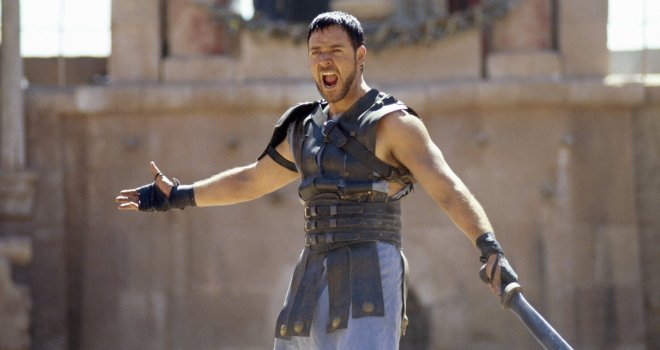
Want to watch something that’s really cool, but also educational? If you’re a fan of ancient history, I suggest you check out one very interesting docudramas that’s currently on Netflix. Keep in mind, this is, by definition, a docudrama and not a documentary. It’ll be like watching a movie, except you’ll be seeing the lessons from historians in between the theatrical dramatic stuff. I wasn’t too familiar with docudramas until I checked these out and I first thought to myself, “Wait, the actors are actually speaking?” I wasn’t used to that, but it certainly drew me in. By the end, I learned a lot, took many mental notes, and was thoroughly entertained. Kind of how I was entertained when I was watching Gladiator or Braveheart, except this time I actually got some actual facts. Plus, these aren’t the kind of things you’ll be watching in school, so that makes them better.
The first one goes quite a ways back, back when a not-so little civilization called the Roman Empire were the toughest guys in town. Guess what the docudrama is called? Oh yes, this three-part docudrama covers some dark times of one of the greatest empires in history. The first part covers a particular Roman Emperor that the Gladiator fans should be aware of. He’s the first Emperor to actually fight in the arena as a gladiator and actually win. But no, he didn’t really die in it. His name was Commodus, and surprisingly enough, he wasn’t as bad as the Joaquin Phoenix version. They don’t just cover him, but his father as well. Gladiator fans know the name: Marcus Aurelius. First lesson: Commodus didn’t murder him. Let’s go further.
The second part of Roman Empire covers Rome’s greatest hero: Julius Caesar. Put that whole Shakespeare play aside for one second and let’s just focus on the life and death of Caesar himself. Caesar’s history always fascinated me, so watching this part was by far the most exciting. When it came to an end, I understood why Caesar is considered to be Rome’s greatest hero. From his humble beginnings as a solider, to his ambitious expansion in the territories of the Gallic tribes, all the way to his assassination, Caesar’s story is truly one of a kind. This docudrama doesn’t just cover Rome’s greatest hero, however, it also covers its worst Emperor.
The third part of Roman Empire tells us the story of Caligula, a man who has a reputation for being Rome’s mad Emperor. Every story I’ve read about Caligula always talks about his excessive orgies, his incestuous relationship with his three sisters, and especially his diabolical rule over Rome. While Roman Empire does cover these, it also brings him into a slightly different light. While he did die a madman, he began as an innocent child kept prisoner by Tiberius, Rome’s second Emperor. Once he killed Tiberius for destroying his family, he became Emperor and was actually a fair ruler. Then illness struck him and he collapsed into a coma. When he woke up, the Mad Emperor was born. Quite ironic, huh?
Roman history was always something that interested me, so Roman Empire was massively educational for me. If you’re also a Gladiator fan, like me, you’ll come to learn why Ridley Scott chose to tackle these two Emperors for the film. Marcus Aurelius died of plague, not by Commodus’ hand, but he was a wise old man. He was good to the Roman people and went to war with the Germanic tribes. Let’s not also forget the sister, Lucilla. No Commodus didn’t have an incestuous obsession with her, but she did try to assassinate him. Unlike in Gladiator, real-life Lucilla failed and Commodus had her exiled and then executed. But wait, what about Maximus? Well, the truth is there was no real Maximus Decimus Meridius.
However, the real-life gladiator that inspired Maximus was named Narcissus. Narcissus was the man who trained Commodus to fight like a gladiator, but after a falling out between them, Narcissus assassinated Commodus in his private quarters. Not exactly the grand showdown that was shown in Gladiator, but in my eyes, the real story of Commodus is one of a decent man being destroyed by corruption.
What I loved learning most about Julius Caesar is how human he was. Although he was an able general, he was above all else, a politician. He was ambitious, ruthless, and loved his power, but it’s undeniable that he did great things for Rome. Before he became dictator, he was a loving family man, but tragedy struck when his wife and daughter died. He respected his friend/rival, Pompey, and was horrified when Ptolemy had him killed. When he returned to Rome, he found it in chaos and recognized how corrupt and ineffective the Senate was. This prompted him to break away from the Roman Republic and carve the path for the beginning of the Empire. Before you compare him to your average dictator, keep in mind that he actually created jobs for Roman citizens, had libraries built, and even got the calendar back on track.
Heck, the month of July is named after him. Despite his self-proclaimed greatness, he suffered from epilepsy. The seizures became more frequent in his later years, but it didn’t stop him from pulling Rome out of the frying pan. While the play by Shakespeare portrayed his assassination as the tragedy, the truth is his whole life was quite tragic. Tragic as it was, he was never deterred by it. The epilepsy showed everyone how fragile and human he was, but it didn’t stop him from challenging the Senate. His unjust death by their hands only angered the people of Rome and his legacy lived on through his great-nephew, Augustus Octavian. As ambitious as he was, he saved Rome and helped spread Roman law, language, and customs throughout Europe. There are very few historical figures that can compare to Julius Caesar.
As for Caligula, his segment actually surprised me. Roman Empire revealed the depth of his insanity, but it also portrayed him as a bit of a tragic character. Oddly enough, I actually felt some sympathy for him in the beginning. Tiberius took his family from him, made him his prisoner, and manipulated him into becoming his sort-of protege. Even when he became Emperor, his sole competitor, Tiberius Gemellus, the grandson of Tiberius and Caligula’s cousin, was granted clemency by Caligula and made him his co-ruler. It wasn’t until his illness struck, that the irreversible damage to his brain made him unstable and unpredictable. That was beginning of the end for Caligula. A truly tragic story, but just imagine if he never collapsed into that coma. Would he have become a great Emperor? Just some food for thought.
If you love Roman history like I do, check out Roman Empire on Netflix. You’ll be entertained and on top of that, you’ll walk away learning something. What more can you ask for?
 Follow Us
Follow Us





